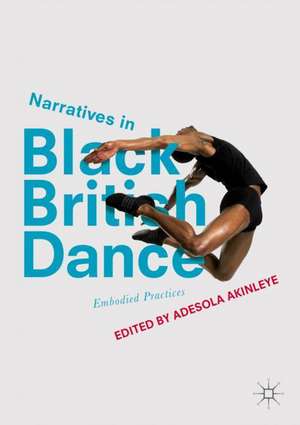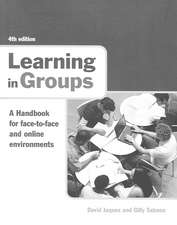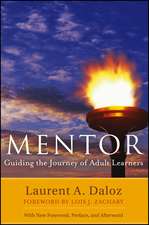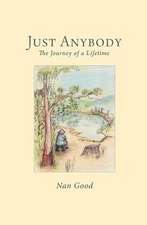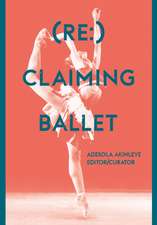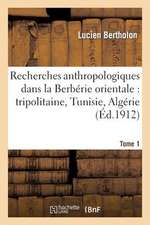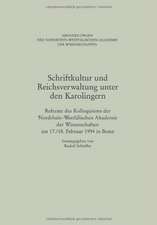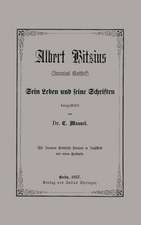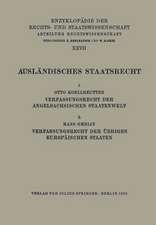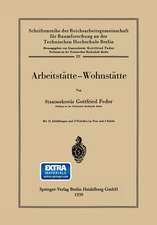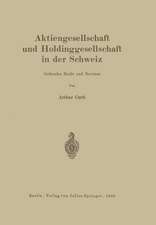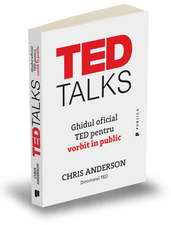Narratives in Black British Dance: Embodied Practices
Editat de Adesola Akinleyeen Limba Engleză Paperback – 20 feb 2018
This book explores Black British dance from a number of previously-untold perspectives. Bringing together the voices of dance-artists, scholars, teachers and choreographers, it looks at a range of performing arts from dancehall to ballet, providing valuable insights into dance theory, performance, pedagogy, identity and culture. It challenges the presumption that Blackness, Britishness or dance are monolithic entities, instead arguing that all three are living networks created by rich histories, diverse faces and infinite future possibilities. Through a variety of critical and creative essays, this book suggests a widening of our conceptions of what British dance looks like, where it appears, and who is involved in its creation.
Preț: 305.50 lei
Nou
Puncte Express: 458
Preț estimativ în valută:
58.46€ • 63.48$ • 49.11£
58.46€ • 63.48$ • 49.11£
Carte disponibilă
Livrare economică 02-16 aprilie
Preluare comenzi: 021 569.72.76
Specificații
ISBN-13: 9783319703138
ISBN-10: 3319703137
Pagini: 343
Ilustrații: XXXII, 296 p. 17 illus., 12 illus. in color.
Dimensiuni: 148 x 210 x 23 mm
Greutate: 0.45 kg
Ediția:1st ed. 2018
Editura: Springer International Publishing
Colecția Palgrave Macmillan
Locul publicării:Cham, Switzerland
ISBN-10: 3319703137
Pagini: 343
Ilustrații: XXXII, 296 p. 17 illus., 12 illus. in color.
Dimensiuni: 148 x 210 x 23 mm
Greutate: 0.45 kg
Ediția:1st ed. 2018
Editura: Springer International Publishing
Colecția Palgrave Macmillan
Locul publicării:Cham, Switzerland
Cuprins
1. Narratives in Black British Dance – An Introduction.- 2. “I don’t do Black-dance, I am a Black dancer”; Namron.- 3. Dance Britannia: the impact of global shifts on dance in Britain; Christy Adair and Ramsay Burt.- 4. Negotiating African Diasporic identity in Dance: Brown Bodies Creating and Existing in the British Dance Industry; Tia-Monique Uzor.- 5. Tracing the evolution of black representation in ballet and the impact on black British dancers today; Sandie Bourne.- 6. In-the-betweeness: Decolonising and re-inhabiting our dancing; Adesola Akinleye and Helen Kindred.- 7. Trails of Ado: Kokuma’s Cultural Self-Defense; Thea Barnes.- 8. Moving tu Balance: An African Holistic Dance as a vehicle for personal development from a Black British perspective; Sandra Golding.- 9. ‘Why I am not a fan of the Lion King: Ethically-informed Approaches to the Teaching and Learning of South African Dance Forms in Higher Education in the United Kingdom; Sarahleigh Castelyn.- 10. Performativity of Body Painting: Symbolic Ritual as Diasporic Identity; Chikukwango Cuxima-Zwa.- 11. Dancehall: a Continuity of Spiritual, Corporeal Practice in Jamaican Dance; H Patten.- 12. Our Ethiopian Connection: Embodied Ethiopian Culture as a tool in Urban-Contemporary Choreography; RAS Mikey (Michael) Courtney.- 13. Reflections: Snapshots of dancing home, 1985, 2010 and 2012; Hopal Romans.- 14. Battling Under Britannia’s Shadow: UK Jazz Dancing in the 1970s and ‘80s; Jane Carr.- 15. Caribfunk Technique: A new feminist/ womanist futuristic technology in Black dance studies in Higher Education; A’Keitha Carey.- 16. More Similarities than Differences: Searching for New Pathways; Beverley Glean & Rosie Lehan.- 17. Epistemology of the weekend: Youth dance theatre; Hopal Romans, Adesola Akinleye, & Michael Joseph.- 18. Transatlantic Voyages: Then and Now; Anita Gonzalez.
Notă biografică
Adesola Akinleye is Senior Dance Lecturer at Middlesex University, UK. She is a practice-based scholar and choreographer, living transnationally and writing and creating performance work internationally.
Textul de pe ultima copertă
This book explores Black British dance from a number of previously-untold perspectives. Bringing together the voices of dance-artists, scholars, teachers and choreographers, it looks at a range of performing arts from dancehall to ballet, providing valuable insights into dance theory, performance, pedagogy, identity and culture. It challenges the presumption that Blackness, Britishness or dance are monolithic entities, instead arguing that all three are living networks created by rich histories, diverse faces and infinite future possibilities. Through a variety of critical and creative essays, this book suggests a widening of our conceptions of what Black British dance looks like, where it appears, and who is involved in its creation.
Caracteristici
Remedies the distinct lack of publication on Dance of the African Diaspora from a post-colonial British perspective Includes work from scholars and artists from across the field of dance Explores the multi-layered, multi-dimensional nature of artists and artistic work from within the spectrums of ‘Blackness', ‘Britishness’, and ‘dance’
